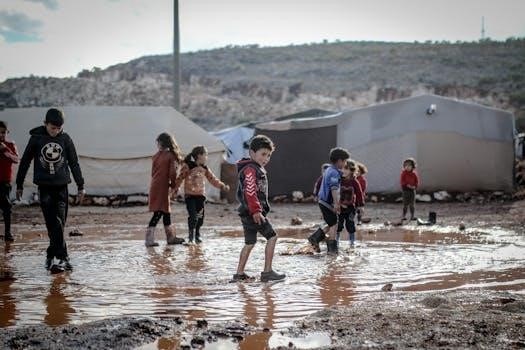Global War Studies is an interdisciplinary academic field examining the causes‚ consequences‚ and prevention of large-scale conflicts affecting multiple regions․ It analyzes historical trends‚ current geopolitical dynamics‚ and potential future scenarios‚ drawing from political science‚ history‚ economics‚ and sociology to understand this multifaceted phenomenon․

Defining Global War⁚ Scope and Characteristics
Defining Global War requires understanding its expansive scope and distinguishing characteristics․ Unlike localized conflicts‚ global wars involve multiple major powers across different continents‚ impacting global economies and societies․ Key characteristics include widespread geographical reach‚ significant resource mobilization‚ and profound consequences on international political structures․
The scope extends beyond military engagements to encompass economic warfare‚ ideological battles‚ and technological competition․ Global wars often result in humanitarian crises‚ mass displacement‚ and long-term environmental damage․ Furthermore‚ they trigger significant political restructuring and geopolitical shifts‚ reshaping alliances and international norms․
Understanding the characteristics of global war also involves analyzing the underlying causes‚ such as ideological clashes‚ economic competition‚ and political instability․ These factors contribute to the escalation of regional conflicts into global confrontations․ The study of past global conflicts provides valuable insights into recognizing and preventing future occurrences․
In essence‚ a global war is not just a large war; it’s a systemic crisis that transforms the global order‚ impacting virtually every nation and individual․ This definition frames the context for further exploration into its historical precedents‚ causes‚ and potential future manifestations․
Historical Precedents⁚ Examining Past Global Conflicts
Examining historical precedents is crucial for understanding the dynamics of Global War․ World War I‚ originating in Europe‚ quickly escalated into a global conflict involving major powers and revolutionizing warfare through advancements in technology․ Its consequences reshaped the political landscape‚ leading to the collapse of empires and the rise of new nations․
World War II‚ even more expansive‚ involved ideological battles‚ widespread destruction‚ and the Holocaust․ The war’s outcome led to the formation of the United Nations and a new global order dominated by the United States and the Soviet Union‚ ushering in the Cold War era․
The Cold War‚ although not a “hot” war on a global scale‚ represented an ideological and geopolitical struggle that influenced conflicts worldwide․ Proxy wars and the threat of nuclear annihilation shaped international relations for decades‚ demonstrating the potential for global conflict even without direct large-scale military engagement between major powers․
Analyzing these historical precedents provides insights into the causes‚ consequences‚ and characteristics of global war‚ informing strategies for conflict prevention and global security in the present and future․ Understanding these patterns is essential for navigating current geopolitical tensions and preventing future global catastrophes․

Causes of Global War⁚ A Multifaceted Analysis
Global War emerges from a complex interplay of factors․ These encompass ideological clashes‚ economic competition‚ political instability‚ and systemic failures in international governance․ Understanding these multifaceted causes is crucial for effective conflict prevention and maintaining global peace․
Ideological Conflicts and Power Struggles
Ideological conflicts and power struggles are significant drivers of global war‚ stemming from clashes in fundamental beliefs and values between nations or groups․ Historically‚ these conflicts have manifested as struggles between democracy and authoritarianism‚ capitalism and communism‚ or religious fundamentalism and secularism․ These ideological divides often fuel distrust‚ animosity‚ and a sense of existential threat‚ leading to the escalation of tensions and the potential for armed conflict․
Power struggles‚ on the other hand‚ arise from competition for dominance‚ influence‚ and resources on the global stage․ Nations vying for regional or global hegemony may engage in proxy wars‚ arms races‚ or direct military interventions to advance their interests and undermine their rivals․ The pursuit of power can also manifest as competition for control over strategic territories‚ vital resources‚ or key trade routes․
Moreover‚ the interplay between ideological conflicts and power struggles can create a volatile mix‚ where ideological differences are used to justify or rationalize the pursuit of power․ The Cold War‚ for instance‚ exemplified this dynamic‚ with the ideological struggle between the United States and the Soviet Union serving as a backdrop for a global power competition․ Understanding these complex interactions is essential for comprehending the root causes of global war and developing effective strategies for conflict resolution․
Economic Competition and Resource Scarcity
Economic competition and resource scarcity are significant contributors to global war‚ as nations vie for economic dominance‚ access to vital resources‚ and control over global markets․ Competition for economic power can manifest as trade wars‚ currency manipulation‚ and protectionist policies‚ which can escalate into broader geopolitical conflicts․ The pursuit of economic advantage can also lead to the exploitation of weaker nations‚ creating resentment and instability․
Resource scarcity‚ particularly of essential commodities such as water‚ energy‚ and minerals‚ can exacerbate tensions between nations and regions․ Competition for these scarce resources can lead to territorial disputes‚ armed conflicts‚ and humanitarian crises․ Climate change‚ with its potential to disrupt agricultural production and exacerbate water shortages‚ further intensifies resource scarcity and its associated risks․
Moreover‚ the combination of economic competition and resource scarcity can create a perfect storm for conflict․ Nations seeking to secure their economic interests may resort to military force to gain access to vital resources or to protect their trade routes․ Understanding these economic and environmental drivers of conflict is crucial for developing sustainable solutions and preventing future global wars․ International cooperation‚ fair trade practices‚ and responsible resource management are essential for mitigating these risks․
Political Instability and Systemic Failures
Political instability and systemic failures within and between nations significantly contribute to the risk of global war․ Weak or failing states‚ characterized by corruption‚ lack of rule of law‚ and internal conflict‚ can become breeding grounds for extremism and regional instability‚ potentially attracting external intervention and escalating into larger conflicts․ The absence of effective governance and the inability to address societal grievances can fuel civil wars‚ insurgencies‚ and humanitarian crises‚ further destabilizing the international system․
Systemic failures in international institutions‚ such as the United Nations‚ can also contribute to the outbreak of global war․ The inability of these institutions to effectively resolve disputes‚ enforce international law‚ and prevent aggression can embolden rogue states and undermine the collective security framework․ The rise of nationalism and populism‚ coupled with a decline in multilateral cooperation‚ further weakens the ability of the international community to address global challenges and maintain peace․
Moreover‚ the erosion of democratic norms and the rise of authoritarian regimes can increase the risk of conflict․ Authoritarian leaders may be more likely to resort to aggression to consolidate power or to deflect attention from domestic problems․ Strengthening democratic institutions‚ promoting good governance‚ and reforming international organizations are essential for mitigating the risks posed by political instability and systemic failures․

Consequences of Global War⁚ A Devastating Impact
Global war unleashes devastating consequences extending far beyond immediate battlefields․ It precipitates humanitarian crises‚ economic ruin‚ and lasting political upheaval․ Societies face infrastructure collapse‚ mass displacement‚ and long-term health impacts‚ hindering recovery and reshaping geopolitical landscapes for generations․
Humanitarian Crisis and Displacement
Global wars inevitably trigger immense humanitarian crises‚ forcing millions to flee their homes‚ seeking refuge from violence and destruction․ Armed conflicts lead to widespread displacement‚ creating massive refugee flows that overwhelm neighboring countries and international aid organizations․ The consequences are devastating‚ with displaced populations facing shortages of food‚ water‚ shelter‚ and medical care․
The breakdown of social structures and governance further exacerbates the crisis‚ leaving vulnerable populations at risk of exploitation‚ abuse‚ and disease․ Women and children are particularly susceptible‚ facing heightened risks of sexual violence‚ trafficking‚ and recruitment into armed groups․ The long-term effects of displacement can be profound‚ with communities struggling to rebuild their lives and integrate into new environments․
Moreover‚ humanitarian access is often hindered by ongoing conflict‚ making it difficult to deliver aid to those in need․ Warring parties may deliberately target humanitarian workers or block access to besieged areas‚ further compounding the suffering of civilians․ Addressing the humanitarian consequences of global war requires a coordinated international response‚ including providing immediate relief‚ protecting vulnerable populations‚ and supporting long-term recovery efforts․ Failure to do so can lead to protracted crises and lasting instability;
Economic Devastation and Infrastructure Damage
Global wars inflict catastrophic economic damage‚ disrupting trade‚ destroying infrastructure‚ and depleting resources․ Conflict zones experience widespread destruction of factories‚ transportation networks‚ and communication systems‚ crippling economic activity․ Agricultural production is severely affected‚ leading to food shortages and famine․ The displacement of populations further exacerbates the economic crisis‚ as skilled workers flee conflict areas‚ disrupting supply chains and productivity․
Furthermore‚ global wars lead to massive government spending on military operations‚ diverting resources from essential social services such as healthcare‚ education‚ and infrastructure development․ The resulting debt burden can cripple national economies for decades‚ hindering long-term growth and development․ The destruction of infrastructure‚ including power plants‚ water treatment facilities‚ and hospitals‚ has devastating consequences for public health and sanitation․
Rebuilding damaged infrastructure requires significant investment and international assistance‚ often taking years or even decades to complete․ The economic consequences of global war extend far beyond the immediate conflict zone‚ impacting global trade‚ investment‚ and financial markets․ The uncertainty and instability created by war can lead to a decline in investor confidence‚ reduced economic growth‚ and increased poverty worldwide․ Addressing the economic devastation and infrastructure damage caused by global war requires a comprehensive and sustained international effort․
Political Restructuring and Geopolitical Shifts
Global wars invariably lead to significant political restructuring and profound geopolitical shifts‚ reshaping the international order and altering the balance of power․ The outcomes of these conflicts often result in the collapse of existing empires and the emergence of new nation-states‚ redrawing political boundaries and creating new alliances․ International organizations may be formed or reformed in an attempt to prevent future conflicts and promote global stability․
The victorious powers typically exert greater influence on the international stage‚ shaping the post-war political landscape and promoting their own interests․ Conversely‚ defeated nations may experience political instability‚ economic hardship‚ and social unrest‚ potentially leading to regime change or internal conflict․ The rise and fall of great powers can be accelerated by global wars‚ altering the distribution of power and influence in the international system․
Furthermore‚ global wars can trigger ideological shifts and social movements‚ challenging existing political norms and values․ The experience of war can lead to increased demands for democracy‚ human rights‚ and social justice‚ as well as a greater awareness of the interconnectedness of nations․ The political restructuring and geopolitical shifts resulting from global wars can have long-lasting consequences‚ shaping the course of international relations for decades to come․ Understanding these transformations is crucial for comprehending the evolving dynamics of the global political landscape․
The Role of Technology in Modern Global Warfare
Technology plays an increasingly pivotal role in shaping the landscape of modern global warfare‚ influencing strategies‚ tactics‚ and the overall impact of conflict․ Advancements in weaponry‚ communication‚ and surveillance systems have transformed the way wars are fought‚ creating new challenges and opportunities for both state and non-state actors․ The development of precision-guided munitions‚ drones‚ and cyber warfare capabilities has altered the nature of combat‚ blurring the lines between traditional warfare and asymmetric conflict․
Furthermore‚ technology has enhanced the ability to gather intelligence‚ monitor enemy movements‚ and disseminate propaganda‚ influencing public opinion and shaping the information environment․ The proliferation of social media and online platforms has created new avenues for radicalization‚ recruitment‚ and the spread of disinformation‚ further complicating the challenges of modern warfare․ The use of artificial intelligence and autonomous weapons systems raises ethical and legal concerns‚ potentially leading to unintended consequences and escalating the risk of global conflict․
As technology continues to evolve at an accelerating pace‚ it is essential to understand its implications for global security and to develop strategies for mitigating the risks associated with its misuse․ International cooperation and arms control agreements are crucial for preventing the proliferation of dangerous technologies and ensuring that they are used responsibly․ The role of technology in modern global warfare is a complex and multifaceted issue that requires careful consideration and ongoing dialogue․
Preventing Global War⁚ Strategies for Peace and Security
Preventing global war requires a multifaceted approach encompassing diplomacy‚ economic cooperation‚ international law‚ and conflict resolution mechanisms․ Strengthening international institutions‚ such as the United Nations‚ and promoting multilateralism are essential for addressing global challenges and fostering cooperation among nations․ Diplomatic efforts‚ including negotiation‚ mediation‚ and arbitration‚ can help to resolve disputes peacefully and prevent escalation to armed conflict․
Economic cooperation‚ through trade agreements‚ development assistance‚ and financial stability measures‚ can promote interdependence and reduce the incentives for conflict․ Upholding international law and human rights norms is crucial for establishing a rules-based international order and preventing abuses that can lead to instability․ Conflict resolution mechanisms‚ such as peacekeeping operations‚ mediation efforts‚ and transitional justice processes‚ can help to manage conflicts and promote reconciliation in post-conflict societies․
Addressing the root causes of conflict‚ such as poverty‚ inequality‚ and political exclusion‚ is essential for building sustainable peace․ Promoting good governance‚ democracy‚ and the rule of law can help to create more stable and inclusive societies․ Investing in education‚ healthcare‚ and economic opportunities can empower individuals and communities‚ reducing their vulnerability to violence and extremism․ Preventing global war requires a long-term commitment to building a more just‚ equitable‚ and peaceful world․

Case Studies⁚ Analyzing Potential Flashpoints
Analyzing potential flashpoints is crucial for understanding and mitigating the risks of global war․ Several regions and issues around the world present significant challenges to peace and security‚ requiring careful examination and proactive diplomacy․ The South China Sea‚ with its overlapping territorial claims and strategic importance‚ remains a potential source of conflict between major powers․ Escalating tensions in Eastern Europe‚ particularly concerning Ukraine and Russia‚ pose a threat to regional stability and could draw in external actors․
The Middle East‚ plagued by sectarian conflicts‚ political instability‚ and the presence of non-state actors‚ continues to be a volatile region with the potential for wider conflict․ The Korean Peninsula‚ with its ongoing nuclear ambitions and geopolitical rivalries‚ remains a major concern for international security․ Additionally‚ emerging challenges such as climate change‚ resource scarcity‚ and cyber warfare can exacerbate existing tensions and create new flashpoints․
By studying these potential flashpoints‚ policymakers and scholars can gain valuable insights into the dynamics of conflict and develop strategies for preventing escalation․ Understanding the underlying causes of tension‚ the interests of the actors involved‚ and the potential consequences of conflict is essential for promoting peace and stability in a complex and interconnected world․
The Future of Global War⁚ Trends and Predictions
Predicting the future of global war is a complex endeavor‚ fraught with uncertainty‚ yet understanding emerging trends is crucial for proactive conflict prevention․ Several factors are reshaping the landscape of warfare‚ including technological advancements‚ shifting power dynamics‚ and evolving geopolitical landscapes․ The rise of artificial intelligence‚ autonomous weapons systems‚ and cyber warfare presents new challenges to traditional notions of security and could lead to unforeseen escalations․
Great power competition‚ particularly between the United States‚ China‚ and Russia‚ is intensifying across multiple domains‚ increasing the risk of miscalculation and conflict․ Climate change‚ resource scarcity‚ and demographic shifts are exacerbating existing tensions and creating new sources of instability‚ potentially leading to violent conflict․ Non-state actors‚ such as terrorist groups and criminal organizations‚ continue to pose a threat to global security‚ exploiting ungoverned spaces and leveraging technology to expand their reach․
Looking ahead‚ the future of global war may involve a combination of traditional interstate conflict‚ hybrid warfare‚ and asymmetric threats․ Understanding these trends and anticipating potential scenarios is essential for developing effective strategies to mitigate the risks of global war and promote a more peaceful and secure world․
